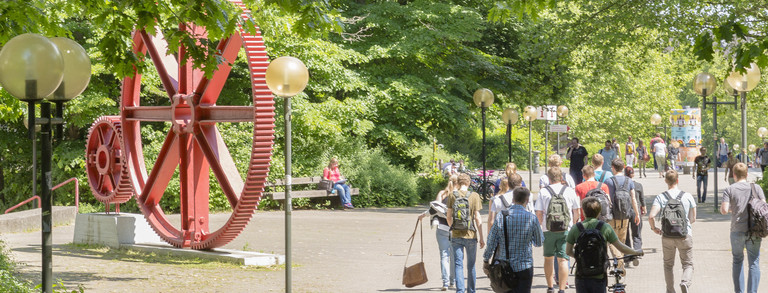BACHELOR-FACHPROJEKTE SOMMERSEMESTER 2020
Bring Your Idea into Reality: Design and Implement Your Own Embedded Systems (English)
-
-
News: The final presentations will be on Friday next week (11th of September, 2020) at 9.00 am (BBB link and access code has be sent by e-mail).
-
Explanation: Due to the corona crisis, TU Dortmund suggests to host the lectures in the summer semester 2020 completely online unless there is any further notification in the future. The organization team of the Fachproject discussed possible forms to host this course online. However, this is basically impossible even if the university opens in May. After brainstorming, we have decided to bring your idea to online projects. We will design some small projects which can be completely carried out online without any specialized hardware requirement. We will give a wide range of project topics that range from embedded machine learning, real-time operating systems, hardware/software codesign (in simulation), and cyber-physical systems (in simulation). Some of them can be further continued as Bachelor thesis topics if you would like. We will first host a seminar meeting to introduce the topics that are offered from our side. You are then requested to join one of the projects designed by us or form a team of 3 people with your own ideas. If you do not like this transformation and would not like to participate in the new format of this Fachproject, please kindly let me know. I will help you de-register from this course.
-
Final Presentation: 11th of September from 9:00 AM.
-
Modul
Design of Embedded Systems
-
Organization
-
We have in total 24 students, and each group can have at most 3 students.
-
In the first meeting, supervisors will give brief presentations to introduce the topics. Each group can select one of these topics and work on it.
-
In the end, each group have to give a talk to present what they have done and submit a report.
-
-
Supervisors
Junjie Shi (E-mail: junjie.shi@tu-dortmund.de)
Mikail Yayla (E-mail: mikail.yayla@tu-dortmund.de)
Prof. Dr. Jian-Jia Chen (E-mail: jian-jia.chen@cs.uni-dortmund.de)
-
Topics (slides)
-
Simulating Security Attacks on Embedded Systems
-
Up to two groups
- Supervised by Lea Schönberger and Junjie Shi
-
Details can be found hier
-
-
Real-Time Scheduler Implementation on Unikraft
-
Up to two groups
-
Supervised by Christian Hakert
-
Details can be found hier
-
-
The Effect of Input Binarization on Neural Network Accuracy
-
Up to two groups
-
Supervised by Mikail Yayla
-
In this project, the students investigate the effect of different methods for input binarization on neural network (NN) prediction accuracy. The goal is create an overview of different binarization techniques and their corresponding effects in the training and testing phase on different datasets.
The students are expected to prepare their own training and evaluation scripts, NN models, and possibly input binarization methods, using a framework and datasets of their own choice.
(We recommend to start with PyTorch and image recognition datasets with small images.)
-
-
Implementing Non-volatile Memory Error Models in PyTorch Tensor using CUDA Kernels
-
Up to two groups
-
Supervised by MIkail Yayla
-
In this project, the students first conduct a literature review on the error models of different emerging non-volatile memory (NVM) technologies, such as PCM, STT-RAM/MRAM, RRAM, etc. Then, the students prepare a simulation framework, in which bit flips are injected according to the bit error models into PyTorch tensors of different data types, using custom CUDA kernels. The goal of this project is to provide a collection of efficient bit error model implementations in PyTorch Tensor for different emerging NVMs.
-
-
Implement A Multiprocessor Event-driven Simulator
-
Up to one group
-
Supervised by Junjie Shi and Kuan-Hsun Chen
-
In this project, the students are required to implement a multiprocessor event driven real-time tasks simulator based on a uni-processor simulator (https://github.com/kuanhsunchen/MissRateSimulator). The new simulator should be implemented based on Python 3, although the old version is based on Python 2. The new implemented simulator should have the partitioned scheduler and global scheduler. Students should have basic knowledge of Python, and real-time task systems.
-
-
Interactive Real-Time Gaming: Design a few games to demonstrate the real-time properties
-
Up to two groups
-
Supervised by Junjie Shi and Kuan-Hsun Chen
-
In this project, the students are required to design and implement a game to demonstrate the real-time properties based on a Free-RTOS emulator (https://github.com/alxhoff/FreeRTOS-Emulator). Basic C/C++ and RTOS knowledge are required.
-
-
-
-
-
Sicherheitsanweisungen
hier
-

